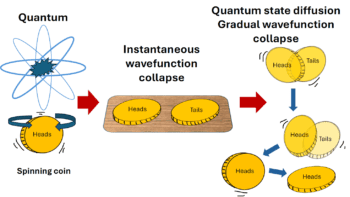The quantum industry is blossoming and has lots of new and exciting jobs that physicists are well placed to fill. Laura Hiscott talks to experts who have studied the quantum-tech jobs market about what’s on offer and what skills you’ll need to forge a successful career in this area

Whether it’s lasers, nuclear power, computing or IT, one of the most exciting aspects of living through the dawn of rapidly evolving technology is that it creates a lot of jobs. In fact, new industries often open up completely new roles that didn’t exist before, offering fresh career opportunities for those willing to take the plunge. Right now, there’s no better example of a burgeoning area than quantum technology and, fortunately for physicists, this is an area they are a perfect fit for.
But what’s so new about quantum technology, given that everything from lasers and semiconductors to magnetic-resonance imagers and fibre-optic cables use quantum principles? These are often loosely characterized as “quantum 1.0” technologies, which rely on quantum effects like spin, tunnelling and quantized energy. The newer “quantum 2.0” technologies, in contrast, actually produce, exploit and read out quantum states of matter. To do this, they use more complicated quantum phenomena, such as superposition and entanglement.
This second wave of quantum tech is of particular interest to KTN, a UK-based organization that aims to drive innovation by promoting networks between universities, hi-tech firms, funding bodies and government organizations. In fact, Najwa Sidqi, a physicist who is KTN’s knowledge transfer manager for quantum technologies, believes that quantum devices could significantly outperform their predecessors.
“Quantum computers, for example, have the potential to handle much more data and to do calculations much more quickly and efficiently,” she says. “A lot of our physical and chemical problems can only be simulated and addressed using quantum models, because nature is quantum. It’s also been proven that photons are the only way to communicate data in a safe and unbreachable way, using the properties of superposition and entanglement.”
Riding the new quantum wave
Quantum 2.0 has three main areas: computing, sensing and communications. Quantum sensing encompasses technologies that use quantum effects to take extremely high-precision measurements, such as atomic clocks for measuring time and trapped ions for detecting electric fields. Quantum communications mostly involves building perfectly secure systems of transmitting information. But it is quantum computing that gets the most attention in the media.
“The main goal of this quantum revolution, which might or might not happen, is a digital quantum computer,” says Ciaran Hughes, a senior research fellow at CERN who recently co-wrote a paper entitled “Assessing the needs of the quantum industry” (arXiv:2109.03601). The paper reports on a survey of 57 US-based quantum companies who were asked about the jobs they would be hiring for in the next few years, as well as the skills and degrees they need employees to have. It is one of the first studies to look in depth at what kind of workforce the quantum industry will require.
Quantum computing is the most ambitious quantum 2.0 area, according to Heather Lewandowski, professor of physics at the University of Colorado Boulder, who co-wrote the report, with potential applications in everything from cryptography and drug design to new materials for carbon capture. In the near term, though, she thinks that quantum sensing is the area with the most immediate promise. Quantum gravity sensors, for example, which measure gravitational gradients very precisely, could be useful for civil engineering projects, and are closer to being ready for use than quantum computers.
Nevertheless, investment is very high across all these areas. That becomes obvious if you look at the interactive tool of the “quantum landscape”, drawn up by Sidqi and her colleagues at KTN, which maps out the UK’s activities in quantum tech. It includes information on publicly funded projects, as well as the six big national centres that house most of the UK’s research capabilities in the area.
The tool also lists 160 research groups and more than 200 businesses that have quantum capabilities, indicating the “main interests” of the businesses. This showcases the huge variety of quantum applications, with companies working in areas from aerospace and cryogenics to geoscience and healthcare. There are familiar names such as Airbus and Leonardo, as well as countless start-ups and smaller companies.
Careers in quantum 2.0
Not so long ago, if you wanted to work on quantum 2.0 technologies, you would probably have had to go into academic research. But, as KTN’s map of quantum industry shows, that is no longer the only option. Indeed, there is a lot of interaction between universities and companies.
“There’s still an important role for fundamental research in academia, but as we’ve seen there have been many spin-off companies from that, such as IonQ and ColdQuanta,” Lewandowski explains. “I think there are increasing partnerships between these companies and academic institutions, probably greater than there has been in a lot of other physics-type disciplines.”
As quantum-tech companies progress towards practical, commercial products that make a return on investment, the number of people working in industry in the sector will grow to outnumber academic researchers. It was the need to understand what kind of workforce this field will require that motivated Hughes, Lewandowski and co-authors to write their paper.
Their study lists the jobs that companies say they will be hiring for, which include many specialized quantum roles, such as error correction scientists and quantum algorithm developers. However, those firms will also be looking for non-quantum roles, but where a science background is needed, such as test and measurement engineers, data scientists, cryogenics scientists and circuit designers. So don’t be put off from the quantum sector if you don’t have a PhD in quantum physics: there’s a lot more on offer.
The arXiv paper also asked the companies surveyed about the level of education needed for each of the roles they are hiring for. For most of the jobs, most companies say they required a Master’s degree or a PhD, but Lewandowski points out that this will change over time. “Right now it’s a bit skewed towards the higher degree levels,” she says. “But as the industry moves from R&D into products you’ll see more at the bachelor’s level.”
According to Sidqi, there are also many jobs needed in the UK quantum industry that don’t require specifically “quantum 2.0” skills. “Photonics and looking at how we generate photons is important for quantum communication, for example, and laser development for atomic cooling is also a big area,” she explains. “Materials science is a focus for building hardware for quantum technologies, as is work on semiconductors. People with a physics background are highly sought after on both the software and hardware sides.”
Skills for the quantum industry
Another finding of the arXiv paper is that there is much more consensus among quantum-tech companies about the skills they need than about the degrees that workers in the sector need. Some require specialized expertise in areas like quantum algorithm development, for example, while others need non-quantum capabilities, such as electronics and software development. Hands-on skills are vital too, including laboratory and experimental experience, as well as knowing how to program and an ability to work in interdisciplinary teams. To develop these skills, Hughes and Lewandowski suggest gaining practical experience through an internship or by contacting an academic who has a lab and might take on a student.
Whatever your background, though, you’re likely to have lots of on-the-job training if you go to work for a quantum company. A 2020 study that Lewandowski also co-authored (Phys. Rev. Phys. Educ. Res. 16 020131), for example, revealed that 95% of quantum companies surveyed expected their employees to learn the necessary skills on the job. “It typically takes many months of training for people hired in these jobs,” says Lewandowski, “so you don’t need to have 100% of the skills walking in on the first day.”
It typically takes many months of training, so you don’t need to have 100% of the skills walking in on the first day
Sidqi echoes this, recalling her own transition from university to working in industry before she moved to KTN. Although she took many courses on semiconductor physics during her Master’s degree, and learned the underlying theory of how electrons move within them, it wasn’t until she went to work at STMicroelectronics that she learnt how you actually make semiconductors and how they function within a finished product.
Since both sides of training are essential, collaborations are springing up between universities and companies to design courses that incorporate both. “There has been an effort across the UK, the EU and the US to launch quantum Master’s programmes, many of which are sponsored by industry,” says Sidqi. Within the UK, you can find much of this information on KTN’s map of the quantum landscape, which includes universities and Centres for Doctoral Training, as well as the industrial partners involved and the funding that the programmes have been given.
One example is the University of Bristol, which has developed a Master’s degree in optoelectronic and quantum technologies. As part of the course, students complete a research project, either based at the university or with one of the industrial partners. On the other side of the world, meanwhile, the University of New South Wales in Sydney, Australia, has even launched a whole undergraduate degree in quantum engineering.
Outside specialized degree programmes, many institutions are also beginning to offer short classes in quantum physics that anyone can take to gain new skills relevant to the quantum sector. There are even some decent free resources available online for anyone who wants to learn more. Qiskit, for example, is an open-source software development kit for quantum software founded by tech giant IBM, and it also has free textbooks and courses on quantum computing.
The UK quantum tech industry at a glance
Information taken from the KTN interactive map of the “quantum landscape”
Six national centres
- National Quantum Computing Centre (led by UKRI)
- Quantum Metrology Institute-NPL (led by the National Physical Laboratory)
- The Quantum Computing and Simulation Hub (led by the University of Oxford)
- UK National Quantum Technology Hub in Sensing and Timing (led by the University of Birmingham)
- QuantIC – the UK Quantum Technology Hub in Quantum Imaging (led by the University of Glasgow)
- The Quantum Communication Hub (led by the University of York)
Biggest public funders
- Engineering and Physical Sciences Research Council – funds 940 projects across 48 organizations
- Science and Technology Facilities Council – funds 143 projects across 33 organizations
Research groups
- 160 groups across more than 68 institutions
Businesses
- More than 200 businesses with quantum technology capabilities
- The most common functions of these businesses are technology provision for supply chains or for end users, consultancy and innovation support
Training centres
- 30 universities, Centres for Doctoral Training and Training & Skills Hubs offering programmes with more than 200 partners from industry and international universities
Keeping your options open
The quantum industry is on the up but it’s still early days and it’s wise not to rush in too fast or try to plan your entire career around it just yet. In fact, Hughes and Lewandowski caution against specializing too narrowly too soon, since there is a lot of uncertainty around if and when this quantum revolution will come to pass.
“This area has some great potential, but I wouldn’t advise people to make career decisions based on the assumption that it will be established in 10 years’ time,” says Hughes. “One problem of going specific early is that you don’t know if the job you’re aiming for is going to be there in that capacity later on.” In any case, your career interests are likely to change over time, so it’s important to be versatile. From the point of view of the quantum industry – or any industry for that matter – it also isn’t healthy to have too many people all wanting to do the same thing.

What you need to know before investing in quantum technology
In fact, more than 50% of the roles that companies are recruiting into require no essential quantum skills at all according to the arXiv paper, and this percentage will probably increase further as businesses expand and progress towards products. On the other hand, non-quantum competencies, such as software and electronics, are required in every role that the paper looked at, highlighting the importance of having a broad set of skills. In light of this, the paper recommends that quantum-specific courses should include more general STEM content, while classical degrees could teach one or two broad quantum courses, so that graduates are quantum-aware, but not trained too specifically too early on.
Above all, says Sidqi, it’s vital for physics students to stay abreast of emerging areas and to be curious and follow developments closely. “There are so many ways you can do this, whether it’s social media, quantum news sites and mailing lists,” she says. “Conferences and job fairs are also a good way to learn.”
So keep an eye on how this field is unfolding, but stay open-minded and strive to develop a broad set of skills. That way, you’ll be versatile and have a lot of career options – whatever the quantum industry landscape looks like when you want to join.



